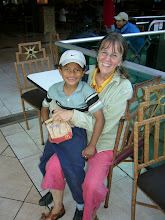One of the most difficult things about living in a third-world, or perhaps a second-world country, is that a foreigner is perceived as "rico" - rich. And relatively speaking, we are. But what this means is that - unless you live in an insulated community, which I can't imagine - you are surrounded by people who have less - way less - than you. And if you are a person who relates to other people, of course you begin to relate to them, as friends, as you would in your own country.
And so you hear the sad stories - parents who have advanced illnesses who would have been cured if they lived in the U.S., even on MediCare; childen they can't take to the hospital even though they are suffering, homes threatened by the chicanery of someone who talked them into taking out a loan they can't pay, homes lost to flood - the list goes on and on, tho medical expenses are a big part. This is especially true in towns where alcoholism and diabetes are rife.
So, as a good friend, again and again you respond to these needs - and are glad to be able to do so.
Unfortunately there are people who see this - or a project to help the needy - as an opportunity to take advantage of. So the stories proliferate and it is only after some time that you discover that those stories were false, there was never an operation, the grandmother didn't really die, and so on.
It is amazing to me that I was so easily tricked, but of course I had my part in it.
I came to Guatemala (without realizing it) emotionally needy - only a few years after the death of my spouse, and the forming of their own partnerships and/or families of all my children - and knowing noone. So I was ready to be invited to birthday parties of the children, to share Christmas with my new friends, and to help when needed. Perhaps I allowed myself to be blinded to the lies or exaggerations.
Now, although everyone is poor, relative to you, not everyone takes advantage. I have had vendors run down the street after me to give me correct change, someone went out of her way to tell me I had dropped a 100 quetzal note in the street (a fortune to them). These things happened many times. And my Friends helped me with some things - bringing soup when I was ill, or a dinner when I first returned from a trip, checking on me if I didn't answer my phone all day. It was not entirely a one-way street; maybe they felt this evened the scale. But that was never a verbal agreement.
When my Friend's economic situation went on a downturn, because there were suddenly lots and lots of people in town doing his type of work, the problem stepped up. Money disappeared from my house several times. He began to pocket money that I gave him to pay people who did work for me.
So that was the end of our friendship. And this was really sad for me; I had depended on his help and his friendship, and that of his family. He had shared much about his life with me, and I cared about him. But allowing him to continue to take advantage of me would have been bad for him as well as me. So I left the friendship, and several years later the work that we did in common. Tough times.
Learning to set clear limits with those you deal with is one of the first priorities, and will save bad feelings and your heart.
Tuesday, November 01, 2016
Subscribe to:
Posts (Atom)

